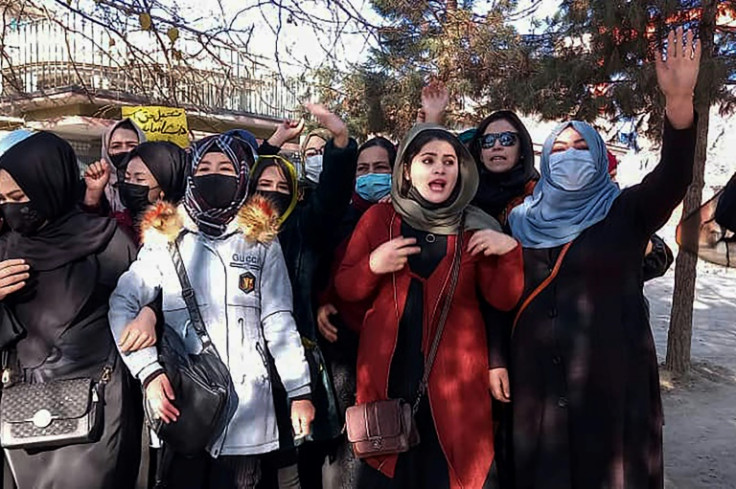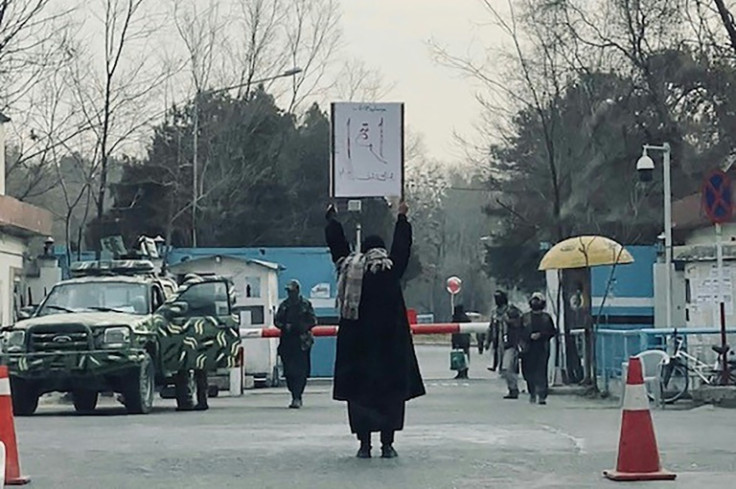Afghan Men Join Protest Against Taliban's Ban On Female Education; Students Walk Out [Videos]

KEY POINTS
- Male students at a university in Afghanistan vowed to not take exams until women are allowed again to attend universities
- A Kabul University professor ripped his diplomas on live TV to show his opposition to the Taliban's decision
- A protest in Kandahar province was marred by violence after Taliban fighters beat up male students
Afghan men have joined protests condemning the Taliban's decision to ban women from attending universities, further fueling the most significant opposition yet to the regime.
Videos posted on Twitter showed hundreds of Afghan male professors and students, as well as the women's husbands and fathers, voicing their opposition to the latest restriction imposed by the Taliban.
One video showed male students at a medical university in the eastern Afghan province of Nangarhar walking out of their classes on Dec. 21 to condemn the Taliban's ban. They vowed to refuse to take examinations until the regime allows women to return to universities.
Male students in Nangarhar medical university walked out of classes in protest of Taliban’s ban on female university students. Tens of others protested in front of the university against this decision. #Afghanistan pic.twitter.com/66DbNiJvtn
— Malali Bashir (@MalaliBashir) December 21, 2022
Similar protests of Afghan male students occurred in the country's capital, Kabul, Radio Free Europe/Radio Liberty reported.
At Mirwais Neka University in southern Kandahar province, around 600 male students walked out of their classes to show solidarity with Afghan women.
Protesting Taliban ban on girls higher education, 600 male students of #Kandahar’s Mirwais Neka University walked out of classes.
— Bashir Ahmad Gwakh (@bashirgwakh) December 24, 2022
Meanwhile several NGOs have told male staff not to come to offices tomorrow as the Taliban bar their women staff from working.#Afghanistan pic.twitter.com/PJJGb3DLgz
Ismail Mashal, a lecturer at Kabul University, ripped up his diplomas during his live interview with Afghan television's Tolo News to show his disgust over the Taliban banning women from higher education.
Mashal said Afghanistan "is no place for an education," CNN reported.
But not all demonstrations were peaceful, as the Taliban tried to quell opposition to its rule.
In Kandahar, a protest was marred by violence after Taliban fighters reportedly beat male university students who walked out of their classes.
طالبان بالای برخی محصلان در کندهار تیراندازی کردهاست
— Radio Azadi (@DaRadioAzadi) December 24, 2022
شماری از محصلان در کندهار از سوی طالبان لتوکوب و بالایشان تیراندازی شدهاست.
در ویدیوی که تازه در دسترس قرار گرفته، معلوم میشود که برخی این محصلان امروز شنبه در جریان امتحان از سوی طالبان لتوکوب شدهاند. pic.twitter.com/gHoKPDF0zM
Ahmad Ehsan Sangar, the president and founder of the activist group Afghan Social Organization, said their protest actions were violently dispersed by the Taliban.
"We raised our voices at night with many slogans and were attacked by the Taliban," Sangar said. "Our location was identified, and the Taliban searched for us. As a leader, I will stand by my fighting sisters. We want a free country, and we want a country where women and men have equal rights."
Last week, Taliban rulers banned Afghan women from attending universities until further notice, claiming that the government scholars found the current curriculum and university environment inappropriate.
Neda Mohammad Nadeem, the Taliban minister of higher education, claimed that female students were not following the dress code.
The decision was met with condemnation from other Islamic governments.
Ibrahim Kalin, Turkey's presidential spokesperson, said the ban was "against the spirit of Islam."
Amiera al-Hefeiti, the United Arab Emirates ambassador to the U.N., also condemned the Taliban during a U.N. session.
But the Taliban has not stopped curtailing women's rights in the country, as it announced that it is barring women from working in national and international non-government organizations.

© Copyright IBTimes 2025. All rights reserved.






















